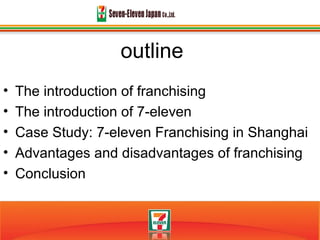20108115337211
- 1. outline ? The introduction of franchising ? The introduction of 7-eleven ? Case Study: 7-eleven Franchising in Shanghai ? Advantages and disadvantages of franchising ? Conclusion
- 2. The introduction of franchising ? Brief introduction: The idea of franchising ? History & development ? Types of franchising
- 3. What is franchising? Franchising is the practice of using another person's business model.
- 4. History & development ? came to prominence until the 1930s in the United States ? the rise of franchise-based food service establishments
- 5. Types of franchising ? Trade Name Franchising eg: international hotel chains. ? Product Distribution Franchising eg: the brewery industry's sales of international soft drinks ? Business Format Franchising
- 6. The introduction of 7-eleven ? History and development ? 7-eleven franchising in China
- 7. introduction ? Founded in America in 1927(South Mainland Ice Company) Milk,eggs,bread Opened 16 hours per day Changed its brand name to 7-11 in 1946 Open the age of convinient stores! cover 18 countries
- 8. Franchising in China ? In 1992 in Shenzhen ? In 1995 in Guangzhou ? (restriction of foreign investment on franchising-----failed to develop rapidly) ? Guangdong Saiyi convenient stores Company ltd ? Got a passport of setting up 300 stores in Guangdong
- 9. 7-eleven Franchising in China In 2005 in Beijing ? Registered fund:35million dollars ? Till August over 590 shops ? 512 ¡ª Guangzhou 75 ¡ª Beijing In 2009 in Shanghai ? Franchiser: Uni-president Company ( ̨Íåͳһ¹«Ë¾ )
- 10. 7-eleven Franchising in Shanghai
- 11. When: 2009 Who: Taiwan President Chain Store ̨Íåͳһ³¬ÉÌ (right of management £© Why: (late) Japan-based strategic consideration
- 12. 1 ¡¢ mature convenient chain store management ( ³ÉÊìµÄ±ãÀûµêҵ̬£© 2 ¡¢ fierce competition
- 14. 1 ¡¢ Kuai can dao/quick meal counter ( ¿ì²Íµº·þÎñ£© 2 ¡¢ hao dun/good stews ( ºÃ ìÀ£© 3 ¡¢ 7-Eleven¡¯s City Cafe ¡¡
- 16. Advantages and disadvantages of franchising for the franchiser for the franchisee
- 17. 1.National expansion of the brand 2.Reduction of competitors¡¯ abilities 3.Attraction of entrepreneurs 4.Improvement of market share 5.Unique services the customers Key advantages for the franchisor are:
- 18. Key advantages for the franchisee are: 1.Access to a proven business concept 2.An operating blueprint 3.Training 4. management support 5.Exchange ideas and experiences
- 19. Key disadvantages for the franchisor 1.mistakes of unsatisfactory franchisees. 2.difficult to control franchisees. 3.have to share profits with franchisees,.
- 20. Key disadvantages for the franchisee 1.Less freedom and creativity 2.many costs, restrictions and obligations 3.no guarantee
- 22. outline ? The introduction of franchising ? The introduction of 7-eleven ? Case Study: 7-eleven Franchising in Shanghai ? Advantages and disadvantages of franchising ? Conclusion























